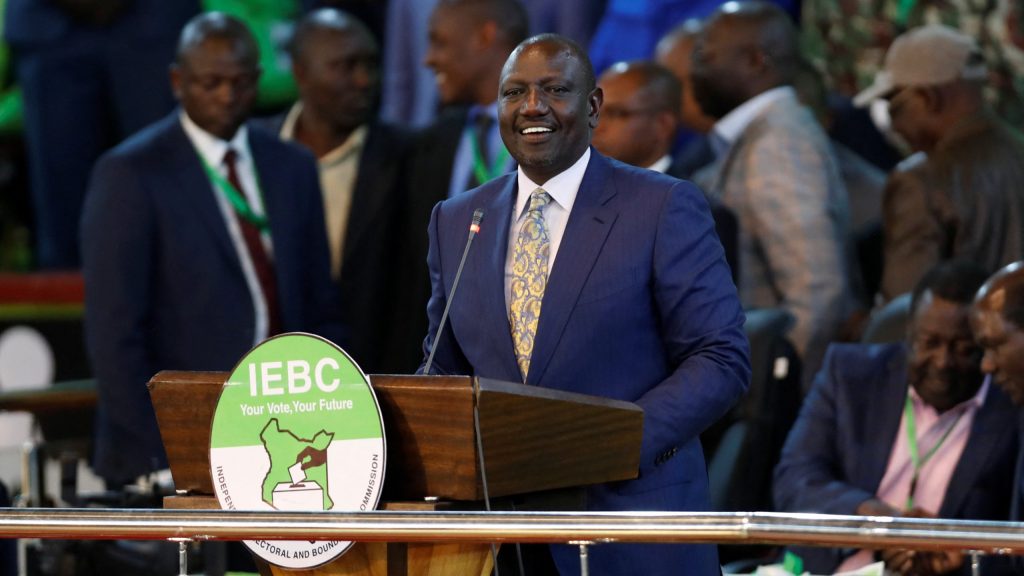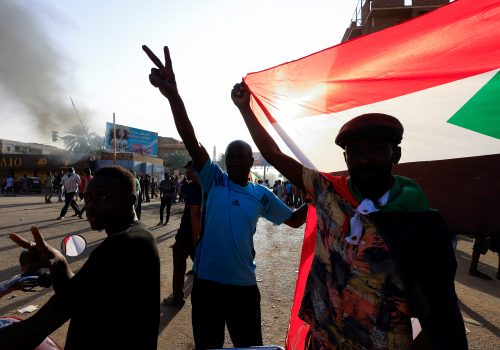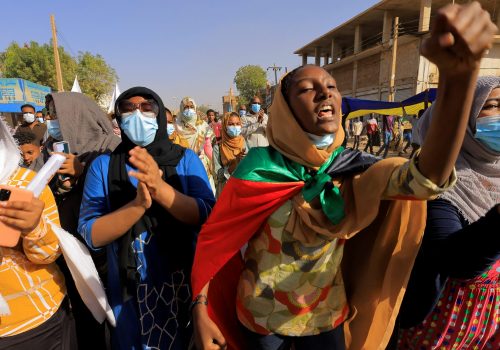While Kenyan Vice President William Ruto was finally declared this week the winner of that country’s August 9 presidential election, the dust has yet to settle: Former Prime Minister Raila Odinga, who reportedly received 48.85 percent of the vote to Ruto’s 50.49 percent, has dug in by officially challenging the result.
Odinga has said he will challenge the result in court—adding to Kenya’s spotty recent history of contested elections. But in the meantime, we asked Atlantic Council Africa Center nonresident senior fellows Constance Berry Newman and Aubrey Hruby to paint a bigger picture of what this East African powerhouse faces in the longer term.
This election has been characterized as a test of democracy in East Africa. Why?
Since East Africa includes politically troubled countries such as Eritrea, South Sudan, and Somalia, where would one go to seek a model of democracy? Maybe Kenya. Since 1992, it has had uneven election experiences—some in which the results were contested, yet in the end were accepted by citizens—but it has had a functioning multiparty democracy since 2002. Even the election crisis of 2007-08 resulted in a workable democratic compromise through a government of national unity, which laid the basis for a new reform constitution. So there is reason to hope that Kenyan democracy and its elections will become models. More broadly, the country is home to many positive trends, including one of the highest literacy rates in Africa, a growing middle class, and some of the most vibrant media on the African continent.
—Constance
Given the concerns around democracy that emanate from Kenya’s neighbors, mainly Uganda and Rwanda, it is natural to look to Kenya as a democratic stronghold in East Africa. Yet still, seeing this election as a test of democracy is a bit too general; more accurately, it is a test of the institutional reform (particularly in the judiciary) that came in the new constitution promulgated in 2010 after the post-election political violence in 2008 that killed 1,200 Kenyans. As Odinga challenges the election outcome in court, the judiciary will have to stand strong against heavy political pressure and maintain its independence and faith in the integrity of the process.
—Aubrey
The economy drove many voters’ concerns. Is Ruto equipped to reverse Kenya’s fortunes?
As a candidate, Ruto indicated his commitment to building one hundred thousand affordable housing units for poor Nairobi residents, creating four million jobs a year, and providing national hospital health insurance for all Kenyans—including those in the informal sector—within the first one hundred days of his presidency. These are extremely ambitious commitments for Kenyans who are all too familiar with disappointment. But Ruto knows the good, the bad, and the ugly of Kenya; therefore if anyone can manipulate the levers of government and the private sector to make life better for the Kenyans, it is him.
—Constance
Like many countries around the world, Kenya is struggling with high inflation and slower growth as a result of the COVID-19 pandemic, the reduction in tourism in African markets, and the war in Ukraine. Inflation crested 8 percent in July—a more than five-year high—and youth unemployment is rampant. Growth slowed in 2022 and is expected to end up somewhere between 5 and 6 percent, down from the 7.5 percent of 2021. Election uncertainty will be the enemy of business in all of East Africa, which is why the heads of neighboring states moved quickly to congratulate Ruto. As investment has slowed and the strong dollar has made additional borrowing on the Eurobond market prohibitively expensive, it will be critical for the new president to play a strong commercial-diplomacy role abroad with the aim of attracting investment into critical sectors such as agriculture and financial services. Domestically, he will need to focus on expanding credit for small and medium-sized enterprises and making agriculture more productive and climate resilient.
—Aubrey
What else should the new administration expect to accomplish in the coming weeks and months? What challenges will they face?
Key to effective elections is the citizens’ acceptance of the results; this is the responsibility of the election commission, media, opposition, and, importantly, the citizens themselves. Because the results of the election will likely be challenged in court, Ruto must encourage calm while the judicial process unfolds. Depending on the results of the process, whoever is inaugurated will face the challenge of fostering national unity by demonstrating genuine commitment to govern in the interests of all Kenyans. The general population will be concerned about social spending (for example, education and health care) and public discussions about the options could be encouraged. Although debt relief is not a bread-and-butter issue, it will affect all citizens—while the new administration will likely be required to restructure public expenditures, thanks to the terms of a $2.3 billion loan from the International Monetary Fund in 2021.
—Constance
Early indications show Nairobi quite calm despite the challenges to the election, perhaps as a result of the still-fresh memories of 2007. Given that Kenya has been a fast-growing economy over the past decade, whether or not Ruto can deliver economic advancement for the “hustler nation” in the near term will be determined by three factors: how long election uncertainty lasts (and if the election has to be rerun), how quickly he can earn the trust of the Nairobi business and political elite, and his ability to effectively attract investment to fuel Kenya’s return to growth.
—Aubrey
What does a stable and functional Kenya mean for the rest of the region?
The following words describe the role of a stable Kenya: “peacebuilder,” “critical trader,” and “strategic partner.” The country is usually thought of as the regional player to address conflicts (except when it needed help in addressing its own conflict in 2007). In 2005, for example, the Comprehensive Peace Agreement which ended the civil war in Sudan was largely brokered because of Kenyan perseverance. It has also had historically close political ties with the United States, China, and India, which makes its stability important for East Africa.
—Constance
Kenya is the dominant player of East Africa, constituting more than 40 percent of the region’s gross domestic product (GDP) and playing home to Mombasa—the coastal city through which most trade with the region happens. As much as 85 percent of Ugandan imports and exports go through Mombasa, and the further expansion of the standard gauge railway in the region will serve to deepen the economic connections. That’s why a stable Kenya is absolutely critical for the region. It is not only the connector of the Horn to the mineral richness of eastern Congo, but also the economic, financial, and logistical hub of East Africa more broadly.
—Aubrey
Further reading
Fri, Jun 3, 2022
Why Biden’s limited Somalia deployment is the right move
New Atlanticist By
Given the persistent terror threat from al-Shabaab, Washington's decision to send US troops into Somalia deserves credit and support.
Mon, Apr 11, 2022
The days of elite deals in Sudan should be over
AfricaSource By
It is not too late for Washington to correct the course on Sudan and help stave off another democracy-delaying elite pact.
Tue, Jan 11, 2022
The US risks losing its influence in the Horn of Africa. Here’s how to get it back.
New Atlanticist By Gabriel Negatu
Evolving crises in Ethiopia and Sudan have exposed Washington’s lack of a clear and coherent policy for the region.
Image: Kenyan President-elect William Ruto speaks after being declared the winner of Kenya's presidential election at the IEBC National Tallying Centre in Nairobi, Kenya, on August 15, 2022. Photo by Thomas Mukoya/REUTERS



